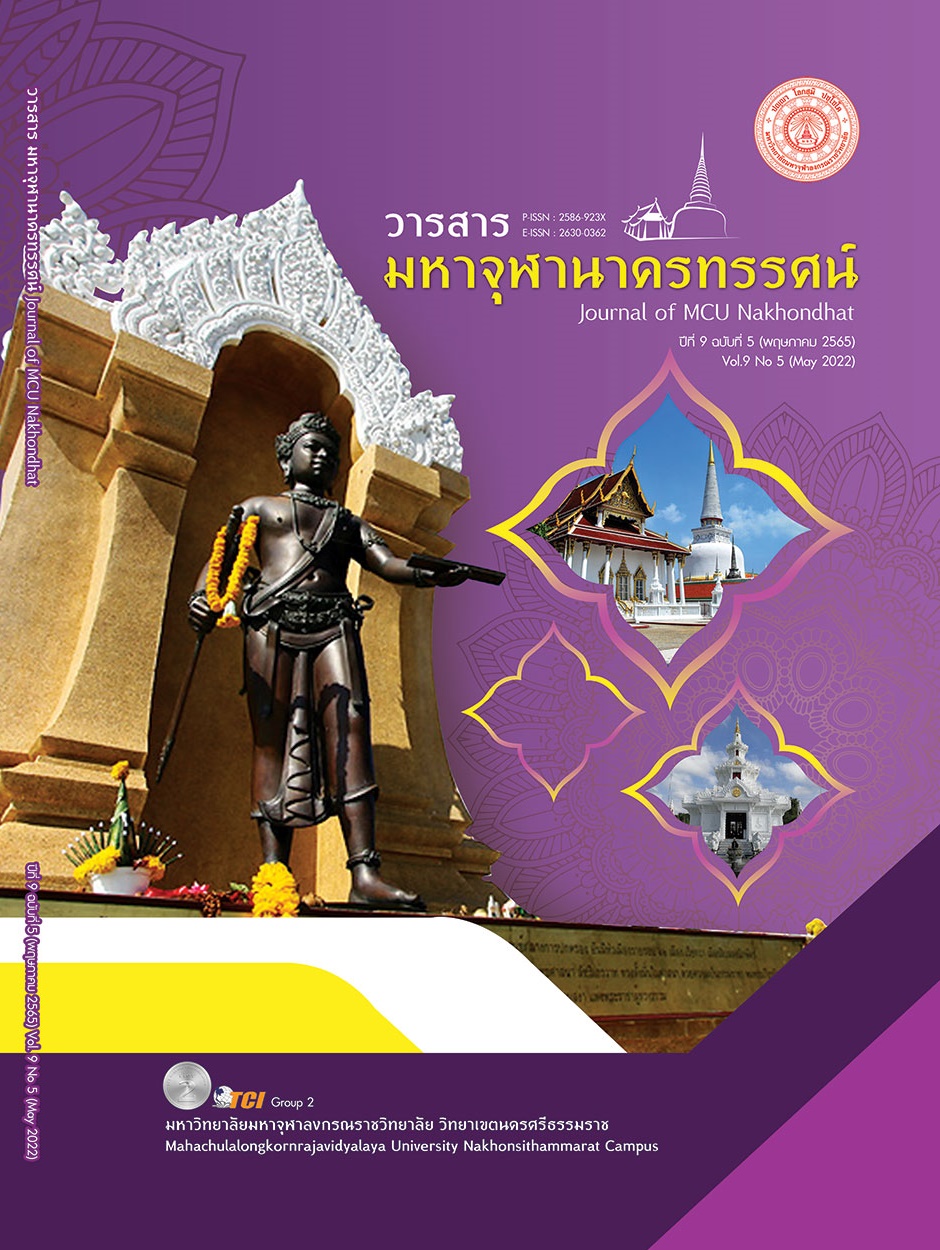POLITICAL INSTITUTIONS AND BUDDHIST GOVERNANCE
Main Article Content
Abstract
A formal social institution concerned with satisfying the needs of its members to live in accordance with the rules of society. control the group of people to live in society peacefully social groups in institutions of politics and government It consists of various social groups, which are clearly organized social groups, known as organizations, such as political parties, ministries, bureaus, departments, etc. Each organization consists of a position or social status. to perform roles and duties according to that status Organizations of important political institutions are as follows: 1) Legislative branch is the organization responsible for making laws 2) Administrative branch is the organization responsible for administration and services to members as a whole 3) Judicial branch is the organization responsible for interpreting laws in case of conflict among the members of society; 4) an independent body is an organization consisting of a group of persons formed in a way free from the influence of Persons who may have interests in the business that is the duty of that independent organization especially the powers of city officials and regular government officials Persons having powers and duties in judicial proceedings The position of a judge was called a “judge.” In ancient times, Thai judges and judges had different powers and duties. Judiciary is a type of civil servant, known as "judicial official", while judge is the position of judicial official. but in the Administrative Court and the Constitutional Court, the term judge is also used to refer to the name of a government official and a position. For the Court of Justice, the term judicial officials of the Court of Justice Create rules and regulations for society
Article Details

This work is licensed under a Creative Commons Attribution-NonCommercial-NoDerivatives 4.0 International License.
References
ชวนากร จันนาเวช. (2560). กดหมายโบราณ จากเอกสารโบราณในภาคตะวันออกเฉียงเหนือ เอกสารวิชาการลำดับที่ 26 กลุ่มงานอนุรักษ์เอกสารโบราณสถาบันวิจัยศิลปะและวัฒนธรรมอีสาน มหาวิทยาลัยมหาสารคาม. มหาสารคาม: อภิชาตการพิมพ์.
ตระกูล มีชัย. (2559). การปฏิรูปประเทศด้านการกระจายอำนาจการจัดการบริการสาธารณะขององค์กรปกครองส่วนท้องถิ่น . กรุงเทพมหานคร: สถาบันพระปกเกล้า.
ตรีเนตร ตันตระกูล. (2560). การพัฒนาทรัพยากรบุคคลในสำนักงานเขตประเวศ กรุงเทพมหานคร. วารสารวิชาการสถาบันเทคโนโลยีแห่งสุวรรณภูมิ (สาขามนุษยศาสตร์และสังคมศาสตร์), 3(2), 1-14.
ทัศนีย์ สาแก้ว และคณะ. (2557). การพัฒนาจิตสาธารณะของอาสาสมัครสาธารณะสุขประจำหมู่บ้านในจังหวัดชัยนาท. ใน สถาบันวิจัยและพัฒนา. มหาวิทยาลัยราชภัฏจันทรเกษม.
บุญชู บุญลิขิตศิริ. (2553). การพัฒนากระบวนการสร้างความรู้ในชุมชนการเรียนรู้เชิงเสมือนสำหรับนักวิชาการในสถาบันอุดมศึกษา. ใน วิทยานิพนธ์ครุศาสตรดุษฎีบัณฑิต สาขาวิชาเทคโนโลยีและสื่อสารการศึกษา. จุฬาลงกรณ์มหาวิทยาลัย.
วุฒิสาร ตันไชย. (2557). การกระจายอำนาจและประชาธิปไตยในประเทศไทย. กรุงเทพมหานคร: สถาบันพระปกเกล้า.
สถาบันบัณฑิตพัฒนบริหารศาสตร์. (2559). Thailand 4.0 โมเดลขับเคลื่อนประเทศไทยสู่ความมั่งคั่ง มั่นคง และยั่งยืน. เรียกใช้เมื่อ 20 กันยายน 2563 จาก http://www.stabundamrong.go.th/web/download/newkm/thailand4.0.pdf
สมคิด ทับทิม. (2560). การพัฒนาชุมชนช่องป่าด้วยทุนทางสังคมตำบลจันดี อำเภอฉวาง จังหวัดนครศรีธรรมราช. ใน วิทยานิพนธ์ สาขาวิชาการพัฒนาท้องถิ่นแบบบูรณาการ. สถาบันการเรียนรู้เพื่อปวงชน.
สำนักงานคณะกรรมการข้าราชการพลเรือน. (2559). กฎหมายเกี่ยวกับวิธีปฎิบัติราชการทางปกครอง. นนทบุรี: สถาบันพัฒนาข้าราชการพลเรือน สำนักงานคณะกรรมการข้าราชการพลเรือน.
สุรเดช อรัญเวช. (2563). การบริหารตามหลักธรรมาภิบาลของทัณฑสถานหญิง จังหวัดนครราชสีมา. วารสารวิชาการ สถาบันวิทยาการจัดการแห่งแปซิฟิค, 6 (3), 308 – 315.
สุรภา ชิตไธสง และตรีเนตร ตันตระกูล. (2563). กลยุทธ์การพัฒนาการตลาดและความสำเร็จของผู้ประกอบการธุรกิจอินทผลัมในเขตภาคกลางของประเทศไทย. วารสารวิชาการ สถาบันเทคโนโลยีแห่งสุวรรณภูมิ, 6(1), 344-356.
อาจารี รุ่งเจริญ. (2557). การใช้เอกลักษณ์จากศิลปะการแสดงพื้นบ้านเพื่อการส่งเสริมการท่องเที่ยวทางวัฒนธรรม: กรณีศึกษาจังหวัดสุพรรณบุรี. วารสารสถาบันวัฒนธรรมและศิลปะ, 16(1). 47-56.


